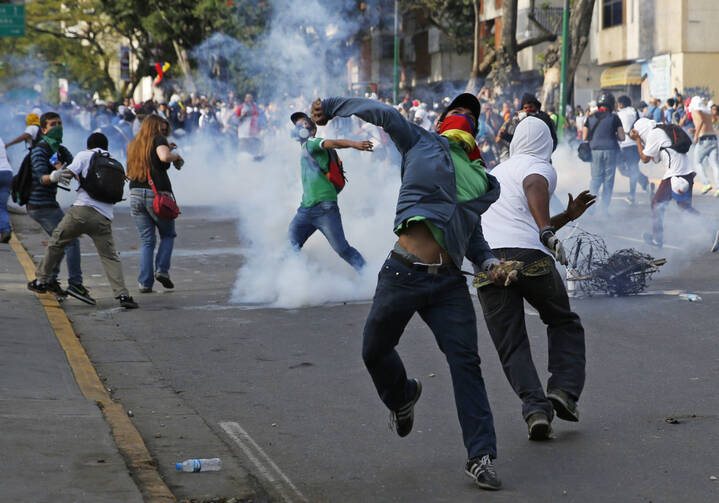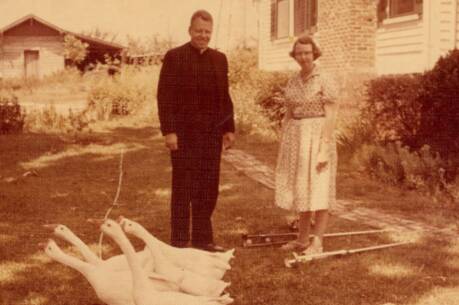Things could not be worse in Venezuela. No, actually, they could be—and probably will be.
Despite its prodigious oil wealth, Venezuela is heading over a financial cliff, and it is heading there faster thanks to the plunging price of crude oil. The socialist revolution founded by the late Hugo Chávez, once the populist patron of Latin America, is now a corrupt and mismanaged economic basket case best known for hyperinflation and crippling shortages of basic consumer goods.
Venezuela’s violent crime is the worst in South America. And the political scene looks just as scary. Chávez’s inept and authoritarian successor, President Nicolás Maduro, is watching antigovernment protests rise as his approval rating tanks. He loudly blames it all on a U.S. “war” against him and on opposition leaders who increasingly find themselves behind bars these days on kangaroo-court sedition charges.
Last month, during demonstrations in the Andean city of San Cristóbal, a 14-year-old student was fatally shot by police. Maduro condemned the killing, but it occurred just weeks after his government gave security forces an O.K. to use deadly force against protesters if they feel “threatened.”
Given that unholy mess, you would think la revolución’s days are numbered. But that is far from certain—and not just because the Maduro regime is cracking down on its opponents.
The fact is, those largely middle- and upper-class opponents can be just as incompetent at winning over Venezuelans as Maduro is at governing them. And that is especially true when it comes to the revolution’s working-class base in the barrios—folks who so far are not convinced that the opposition is a reliable alternative.
That cohort still remains at least tepidly loyal to Maduro and the Chavistas, as the socialist party is known. And that keeps Venezuela’s polarized political math just enough in the socialists’ favor to keep them in power.
But in Miami, home to the largest Venezuelan expatriate community in the United States, the anti-Chavista diaspora may finally be figuring out how to build bridges to their country’s masses. The expats, known as “Doralzuelans” because most live in the suburb of Doral just west of Miami, were shocked last year when antigovernment protests in Venezuela left 43 people dead but did little to bring poorer Venezuelans to the opposition side.
Some of those Doralzuelans did a little soul-searching and realized two things. First, while things may be tough for the poor in Venezuela today, they were in many respects tougher before Chávez came to power in 1999 and brought bodegas, schools, clinics and potable water to their slums. Second, the opposition and its affluent image still remind Venezuela’s poor of their pre-Chávez world.
One result of that epiphany is a Catholic-based expatriate charity group called Programa de Ayuda Humanitaria para Venezuela (Humanitarian Aid Program for Venezuela). Run out of a Doral strip mall, Ayuda started last year as a project to get medical supplies to injured opposition activists.
But Ayuda leaders, like the group’s co-founder, Marisol Dieguez, quickly saw there was potential for a broader outreach. “It was obvious that the same shortages affecting the students and demonstrators we were trying to help was afflicting everyone else in Venezuela, especially the poor,” says Dieguez.
Those scarcities are indeed dire. The Venezuelan Association of Hospitals and Clinics says 78 percent of the items the medical sector there needs to function effectively are in seriously short stock.
As a result, Ayuda now sends large donated shipments of everything from syringes to EKG machines to baby cribs into Venezuela, mostly to medical institutions that serve the indigent. Dieguez says the most frequent requests are for pediatric needs.
“I just got an email from Caracas,” she says, “asking us if we can find infant tracheotomy instruments.”
Dieguez is an outspoken Chavista opponent. But she says one of the gratifying facets of Ayuda’s work is being involved in something with Venezuela that has “nothing to do with anyone’s political affiliation.”
There is obviously nothing political about making sure a baby gets an emergency tracheotomy. But it does help Venezuela’s opposition appear to be a bit more part of the poor’s post-Chávez world.








